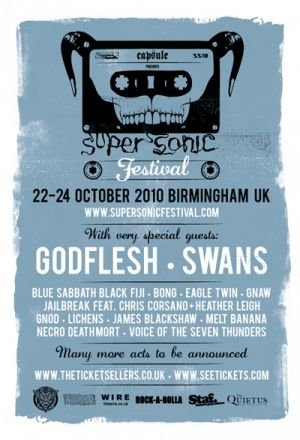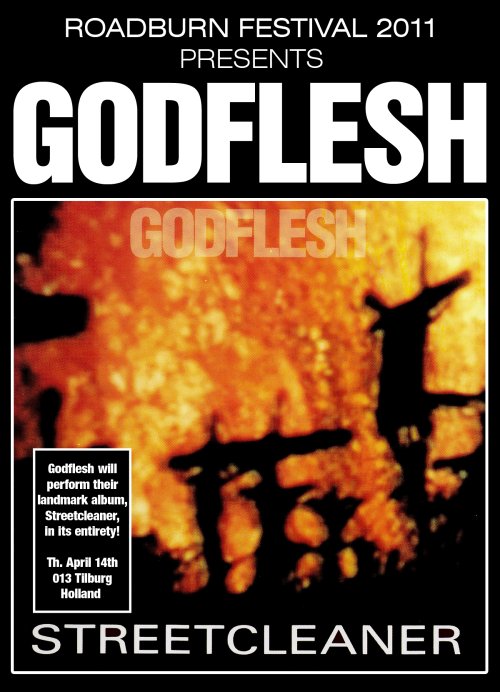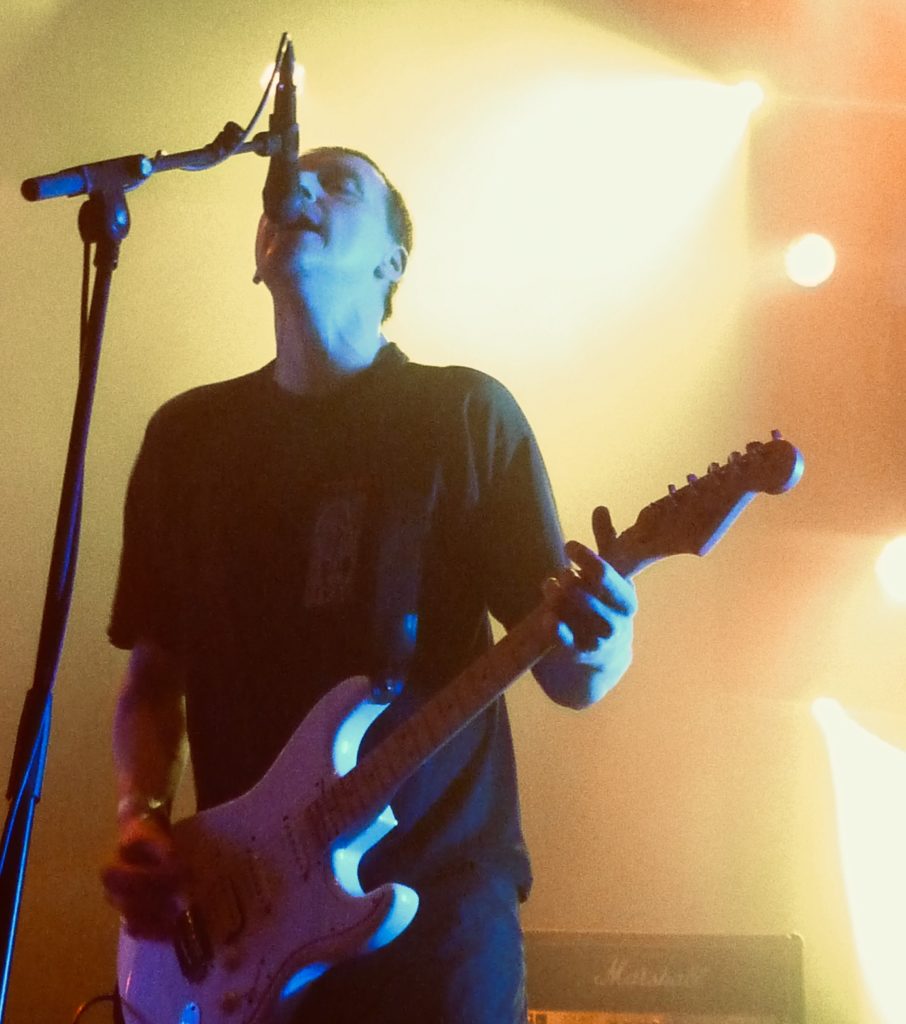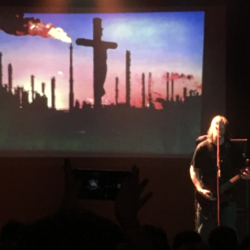INTERVIEW: Justin Broadrick – Godflesh, Jesu
by Diane "Lifer" Farris, January 14, 2021
I’ve got a podcast that mainly consist of interviews done on the air on my WFMU radio show. You can listen here! This transcript is part of the current podcast episode. I spoke with Justin Broadrick of Godflesh, Jesu, Final, etc., etc. We spoke in 2010, at the beginning of the return of Godflesh cycle after Justin really focused on Jesu, Final, Greymachine and other projects. This is only a portion of the interview, and there will be a part 2 to the podcast asa well, so subscribe to it! A couple of fun notes: the transcription software I used found the word Goldfish easier to use than Godflesh, and whenever Jesu was mentioned, it came up with Asia… somewhat bewildering and surreal to ponder if Justin Broadrick was a member of Asia! Check the podcast episode, or check out the entire 3 hour full radio special – complete with 100% Justin Broadrick/JK Flesh music. Either way, enjoy! Justin was a lot of fun to talk to! It’s interesting to look back, and since this conversation there have been 2 Godflesh full lengths (original material) released.
JB: I looked at the website and did you just interview Hugh Cornwell?
DF: Yes, I did.
JB: Wow. Yeah, one of my own heroes as a child. Oh my God. It was the first band I was ever genuinely obsessed with was the Stranglers from about the age of nine years old.
DF: Wow, that’s kind of dirty for a nine year old. No?
JB: Oh God yeah. I can imagine that the versions of the Stranglers songs are pretty good?
DF: Oh yeah, they’re great. They were doing two sets in the clubs. The first set was a mixture of Stranglers songs and Hugh’s solo work. Then the second set was the entire first Stranglers album straight through.
JB: Wow. Holy shit! I mean, Killing Joke and the Stranglers were the most significant bands that hit me at a really young age, basically, the Stranglers was the first; I first saw them live in 1979 as a 10 year old and my my mom and my stepdad brought me, they were with me, they took me to the concert basically. So but they were Stranglers fans as well as the first couple of albums.
DF: What was that like for a 10 year old?
JB: Pretty awesome, really. I mean, I didn’t have much else to put it up against, but the way I’d lived already with the way my parents were, which were basically they were ex hippies, who then got into the whole punk thing. I think what got them into punk in ’77 was Lou Reed. There were big followers of Lou Reed and I think Lou Reed was on the front of one of the big music press in about ’75-’76 I think that was after Metal Machine Music when he became himself he looked sort of, quite punky and all the rest of it, and I think Reed was their avenue into into punk rock in ’76-’77. So both my mom and my stepdad – they bought the first Clash album, Sex Pistols, the Damned, Stranglers. I heard those records when I could just about pay attention, when I was about nine years old in 1978. And I heard the first Stranglers album, something about that just even at that young age -captured me entirely. And it was such a huge influence on my music as well because the bass sound in the Stranglers was has impacted me to this day. Not much like it in the world, you know, apart from maybe the early John Entwistle’s bass sound in the Who, you know what I mean? It’s clearly an influence on JJ Burnel, but, that bass sound I completely ripped off with Godflesh. You know, that was the whole idea – was to take the bass sound, you know! [laughter]
DF: And Hugh Cornwell as a guitar player was was a pretty stark guitar player.
JB: Totally, absolutely another total inspiration to my guitar playing even as a young kid. When I first tried to learn guitar, it was essentially trying to learn some Stranglers songs, you know. Yeah, the way he plays is that, textural and minimal, not that I could articulate that as a 10 year old, but eventually, I came to realize what it was – what the magic was that influenced my guitar playing.
DF: And what’s your favorite Stranglers album?
JB: For me? It’s without doubt Black and White.
DF: Oh, me too!
JB: You as well? Absolutely. Yeah, Curfew, oh my God, the whole sound of that album, everything about it. To be honest, the whole the whole package the sleeve; an absolutely magical, magical record. One of my close friends, David Cochrane who I work with in Grey Machine, Head of David and all that sort of stuff- when I first met him when we were both about 15 or something. He was another huge Stranglers obsessive and he still goes and sees any show he can, you know, but he still lives in Birmingham. I live in the middle of nowhere. So it’s about two hour trip for me to get to a city. So it’s I don’t do shows that often anymore.
DF: Can you outline what’s been going on for you in the last year or so?
JB: Loosely speaking, the last year has seen -besides a Godflesh reformation, which is a pretty big deal for me, and a big deal for a lot of people; oddly enough, Jesu has been averagely quiet until now anyway, and there is a new Jesu release but it’s not new, per se material. It’s a double CD reissue essentially on Hydra Head of the first Jesu release which was on a very tiny UK label as a limited CD pressing. It was actually recorded after the self titled Jesu album but with the Jesu self titled album, there were a few scheduling things with Hydra Head where it didn’t really come out until about a year after I completed the album. I had an avenue and a couple of songs, which I extended, which were the Heartache songs on a tiny UK label, which didn’t have any scheduling issues whatsoever. So they put it out real quick, in 2004, but it never really got any substantial exposure nor substantial distribution either. So it was sort of a bit of a quiet release, and it’s nice now for Hydra Head this many years later to reissue it. And it’s coupled with an unreleased EP, which also was recorded around 2004, which I just sat on, for years, because I’d been so busy pursuing other ideas. I think a lot of people are probably aware of this with the whole industry, that scheduling can become a really big thing. You know, if a label can’t fit in a release within X amount of time, it can sit and stew, and I can end up working on something else. In the interim, I get impatient with records, I’m one of those people who; once I finished a record, I want it out, and it can be quite frustrating to find out the schedule with a label doesn’t permit this, you know, it could be 9-12 months down the line. By the time the record comes out, sometimes I’ve “left” that record. And it’s funny, then, you’re talking about it again, and all the rest of it. So that’s the deal with Jesu. Prior to the last year, I feel myself and I think a lot of people feel the same -that Jesu releases were saturating the world. I was quite enamored with releasing as much as possible because I was writing a lot and I was recording a lot, it took a lot of these releases for it to just occur to me that I should just try and slow down.

Once we actually agreed to do the Godflesh reunion thing, a lot of my time was spent going back to those songs, you know, rehearsing again, and rewriting drum rhythms, etc, etc. So it was good really to stop me from consistently writing Jesu material! [laughter] But I have been writing, I’ve been working for about the last year quite literally, demoing the new Jesu album, which will come out in probably around May, next year basically so, I’ve just been working at, and it’s just nice to have this release, the Heart Ache and Dethroned and singles out, because there hasn’t been a single Jesu release this year prior to this.
DF: So it’s good to get some of the old stuff out to a larger audience.
JB: Yeah, exactly. I mean, very proud of the Heartache release anyway, and felt it needed to be exposed as much as previous records like Conquerer and Silver and stuff. So it was really nice to get it out on Hydra Head and then to actually start getting it around again, basically.
DF: Back to the Godflesh reunion. How did it actually come about?
JB: The catalyst for the reunion was pretty much Hellfest – or previously known as Fury Fest. The main organizer behind that festival had been pursuing me for a number of years about a Godflesh reunion, which, to be honest, I never even discussed with the better half of Godflesh, Ben Green, because he left music when he left Godflesh. He didn’t leave it personally, but left it in terms of working in any serious context. I just felt, even if we were to consider it, not enough time had passed, for it to be valid to us. But, the main promoter of Hellfest really did keep pursuing me. It was about three years down the line of him consistently trying to. I gave in and just said, I will mention it to Ben Green, thinking that Ben was probably quite likely turn around and say “no I really don’t wish to go there again”. For me, I didn’t even really take it that seriously until I mentioned it to Ben, because I just considered he wouldn’t do it. But oddly enough, as soon as I mentioned, it to Ben, he seemed quite immediate about that we should do it again. Which I found a real pleasant surprise. So really, once Ben agreed, I just got into mode, you know, quite literally started to take it quite seriously. Like, can we really do this? I think it was more that we needed to get back in a room again together and, once we did, it was just immediate to us that the spark was still there. I’d been focused upon Jesu for the last six to eight years or whatever it is, which is obviously a completely different context. The performance and delivery -is a different context to Godflesh quite obviously. With Jesu it’s a somber thing, with Godflesh it was about rage. It was questionable for myself whether I could go back to that mode, but obvious that it was very easy for me that this rage, anger, frustration, a lot of emotions that were expressed through Godflesh have never gone away, you know, they’ve probably just become a tad more articulate, but everything was still there and never been removed. For me, I can’t do anything that’s fake. If it involves faking emotion, which for me -music is all emotion, then it’s a pointless activity, irrespective of finances, or anything else that’s involved with it. It immediately occurred to us upon playing together that, these emotions have never gone away. It was a joy, a perverse joy, I guess, to actually go back to the old material and rage again at our tender ages!
DF: There’s so many people that are so grateful that you’re doing that again.
JB: It just really it sort of snowballed, we’ve done very little really, we’ve been in Europe so far.
DF: You did just play recently in Birmingham…
JB: Yeah, it’s a quite a legendary festival run by an organization of women that we’ve known for years. It’s fantastic, Supersonic, because it’s essentially four to five women that run the whole thing, and it’s nice to see, that it isn’t a male dominated environment. These are people who just genuinely connect, and love the music. Yes, Supersonic is Birmingham, that’s Godflesh’ roots, right there, where Godflesh began. So it was really our first UK show, together, as Ben and I as the original Godflesh played. We worked out that we last played Birmingham, was about 1991, I think. It was literally an eternity ago, you know, so it was a real pleasure. And oddly enough, it was quite possibly one of the best Godflesh shows we’ve ever played. And that’s including our entire career since 1988. That proved to us how exciting this still is, how thrilling it really is. The level of appreciation felt tenfold what it was when we even existed. It’s quite bizarre thing. The music, has managed to stay with people. It sort of becomes a legend, quote, unquote, which, for us, is hard to see, obviously, but it’s an honor to be taken so seriously, to some extent and see that you are, it is meaningful, it does resonate with people worldwide, we are thoroughly excited to to play more as Godflesh worldwide, but in a very selective fashion. But we are excited to do it. We are scheduled for Roadburn, playing Streetcleaner in its entirety. I think a few people are going to travel worldwide for that. But what we’ve realized is people traveling worldwide, to get to these Godflesh performances, which is just astonishing, we’re still quite in shock about the way this has been for Godflesh.
DF: Well, it seems and I could be wrong, but was it sort of an incompletion for you when Godflesh ended?

JB: Yeah, as a lot of people who followed the band are aware, you know, the end of the group was, messy. Yeah, it was quite horrible, in many, many, many respects. It would be a cliche to say unfinished business stuff. I think we just needed a lot of time off away from this, to have some sort of sense of perspective about what we were and what we can quite possibly be now, – not that we’re suddenly looking at three years on the road doing a worldwide tour and knocking out three new albums in that time – quite far from it really. In terms of any new Godflesh material, again, that isn’t something that we would find easy. I’d be lying to say I didn’t have riffs etc, etc. But it’s something we wouldn’t want to take the easy route. It’s very easy these days, it seems, to be able to reform and knock out a very lazy record.
DF: But that’s never been what Godflesh ever did. Even though your records were in the same vein, each one of them changed radically. It’s obvious that you pushed the envelope each time, regardless of how well received each Godflesh record was.
JB: Yeah, exactly. As we never took the easy route. I think people were always surprised that we didn’t just knock out another five Streetcleaners, you know, I mean, this is fairly standard, the way bands generally find a successful template, exhaust it, driving out it’s very life by making the same record over and over again, because it’s a formula that’s successful. You know, we obviously never ever took that route. In fact, we made a few suicidal moves, we would do things that absolutely pleased us without any regard for fans or critics. It was an insult, you know, it’s an entirely selfish way of making music. But for me, that’s the only way to make music.
DF: Well, yeah, but we want to hear what’s coming out of you.
JB: Only you know, as a, musician- I can only consider my own tastes first. There’s always going to be people around, people suggesting that, well, if you do this, and do that, you could sell a lot of records, you can make a lot of money and all the rest of it. But it would be soul destroying for me to do anything, that isn’t what I feel completely 100% honest expression of what I wish to do as an artist. To each to their own; people find successful formulism and wish to reap the benefits of it, and that’s fine. Some of these people, obviously, it’s a pleasure to discover a successful winning formula and to stay with it. It would depress me to exist like that, to make something to order, so to speak. So yeah, I mean, this is it that, as a consequence, it means a new Godflesh album, would be extremely challenging to us. And it would need to be challenging. I mean, that the small amounts of stuff that I have written already or, even if it’s just primitive riff writing, it’s quite obvious that it would be an extremely heavy, brutal record, it would still probably be an examination of what Godflesh was, and much more. Not that easy for us.

DF: And I think that because you’ve always pushed yourself and changed and put pressure on yourselves to make sure that your expression is true, that may be why it’s actually easier for you to revisit Godflesh now, because it wasn’t one thing that was stuck with one period.
JB: Yeah, that could be seen as very true. But very, very true. To be honest, maybe this isn’t unusual, but for me, if I work on one thing, and I’m buried in one project, I get tired, very easy, actually. I get bored, quite literally, I find it tedious after a while. And this is what I used to find about touring. I used to find spending 2, 3, 4, or five months on the road around the world, playing the same songs every night, I would find that soul destroying eventually. Because for me, it’s faking it, eventually, the passion for it runs out. As soon as as soon as the passion runs out, then for me, I’m just, you know, I’m dead in the water. You know what I mean? It becomes absolutely meaningless, and music for me has so much meaning. I don’t tour for a number of years now, and there’s many reasons for that. And, you know, that’s one of the reasons I can’t just keep repeating myself. I find it absolutely nullified and utterly pointless. I mean, obviously, the industry exists upon this as well, in the current climate. It’s an absolute necessity that bands play live as much as they can because nobody’s buying records.


